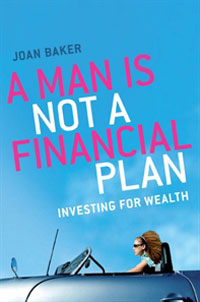a man and a financial plan
from issue 14: by Rachel Longhurst

I often wonder whether I should have paid more attention in maths class. Don’t get me wrong, I can do basic maths and maybe I could have been capable of more had I applied myself. I get that two plus two is four, that three by three is nine, but in truth, I never really had an interest in it. The only time I found math semi-interesting was when we did algebra, and I have a sneaking suspicion that was because letters were involved. Give me letters and language any day over numbers and sums.
I recently read Joan Baker’s A Man is Not a Financial Plan (Allen and Unwin, 2007), a book for women on investing for wealth and independence. The most important message in this book is that women need to be prepared to create their own wealth. Despite the enormous leaps feminism has made, there are still many women who rely on finding a man to bring financial security to their lives. There is no guarantee that love and money are going to come hand in hand. No guarantee that, if it does, this wealth will protect against injury, divorce and death. With the increasing cost of living today, expecting a man to provide financial security is foolish. The reality is that many families rely on two incomes just to get by comfortably.
I’ve never been blasé about money as such. I grew up in a one-income household and, while my father worked damn hard to make sure we never went without, I made a conscious decision that my life would never be that hard. I’m not convinced that money makes people exorbitantly happy, but it does make life easier up to a certain point.
I took myself out of my regional town of birth, waved goodbye to my boyfriend and lived below the poverty line on government support and the minimal extra I was allowed to make (that studies are only now just highlighting isn’t nearly enough). I studied. I acquired a job to ensure that I could support myself, and I’ve taken away from my experiences an appreciation of how money can be spent and managed. I actively started investing for my future.
However, my disinterest in maths did overflow into what some might call a disrespect (I prefer the term ‘slight oversight’) for what numbers can generate. Wealth. Of course I knew wealthy people existed, but it never occurred to me that I might be able to choose to become wealthy. Independent and self-sufficient, yes. But never wealthy.
Joan writes that it’s all about having a simple plan: deciding that you want to be wealthy; learning what you need to about how to create this wealth; and taking action. Seems ridiculously easy, doesn’t it? It isn’t. But Joan’s book investigates and explains the intricacies of markets, investment, reinvestment, and using your income to create wealth in terms that non-financially literate people can understand. It highlights the importance of creating a surplus, budgeting and maximising your income. It advocates for avoiding the vicious cycle of debt by making friends with the virtuous cycle of wealth.
While I’m still not convinced I will be, or even sure that I want to be, wealthy any time soon, I have, as a result of what I read, reassessed what I do with my income, paid off depreciating debts, invested in the property market (apparently I have to be prepared to go into debt initially to make money) and banned myself from acquiring a credit card.
Essentially this book is about offering women choice. They can choose to become wealthy, or just to be comfortable, or somewhere in between. Either way, this book empowers women to feel that they can do it and offers the initial tools and motivation to start.
I’ve begun to appreciate not only what I can do with money, but what my money can do for me. I’ve started to ask sales people (where it’s expected) whether that’s the best price they can do; I’m paying attention to interest rates and what the share market is doing (sometimes); I’m learning what products can be purchased cheaper without skimping on quality; I’ve set myself spending limits and saving goals. I’ve also gained an amazing appreciation for what my parents did on the income they had.
So I have a man and I’m establishing a financial plan. I’ve placed myself on the financial learning curve at least. To be perfectly honest, the word finance still makes me shudder (finance equals money and money equals numbers and numbers remind me of maths)… but to get the most out of life, you must be prepared to get out of your comfort zone. I firmly believe that.

